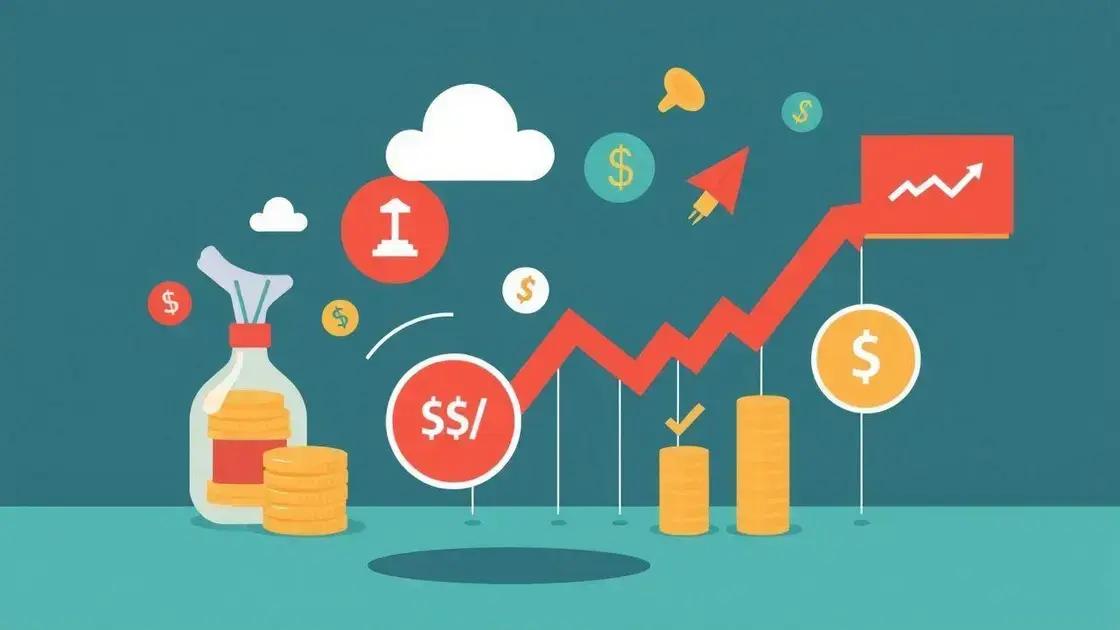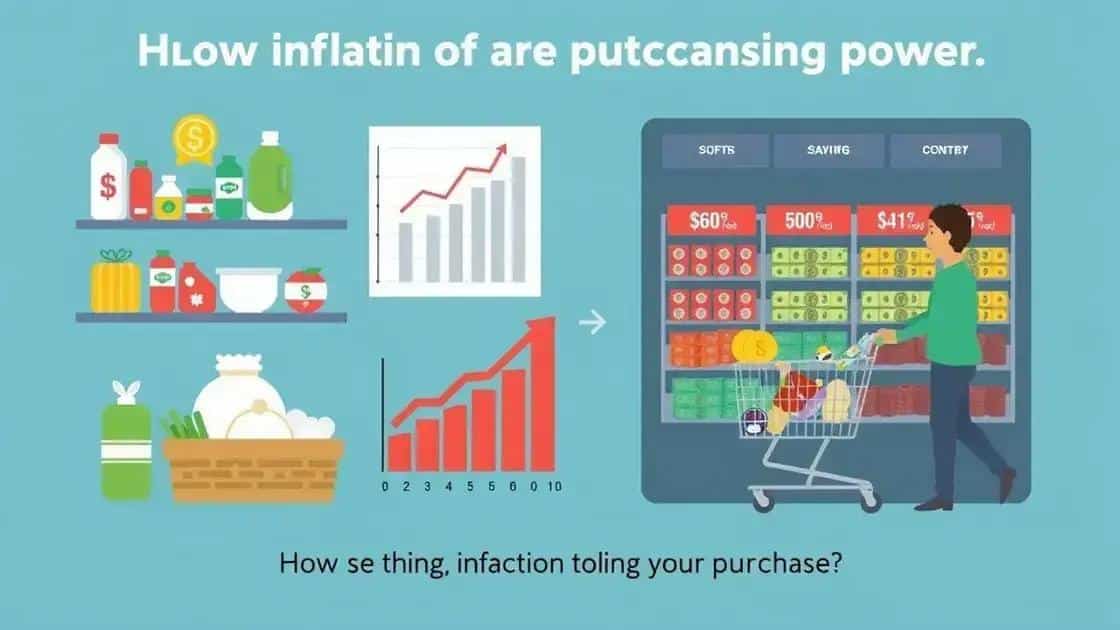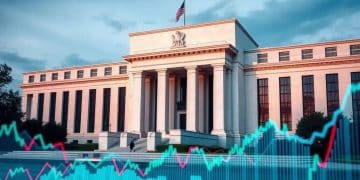Inflation forecast 2025: What to expect next year

Anúncios
The inflation forecast for 2025 suggests rising prices due to various factors, including economic recovery, global events, and changing monetary policies, impacting purchasing power and financial stability.
The inflation forecast 2025 is on everyone’s minds as we look ahead. Have you considered what this might mean for your wallet? Let’s dive into the predicted changes and how you can better prepare for them.
Anúncios
Understanding inflation and its causes
Understanding inflation is crucial as it directly impacts our daily lives and financial well-being. Inflation refers to the rate at which the general level of prices for goods and services rises, resulting in a decrease in purchasing power. What causes it? Let’s explore the key factors.
Economic Growth
As the economy grows, demand for goods and services increases. This heightened demand can push prices up.
Anúncios
Monetary Policy
The central bank (like the Federal Reserve) controls the money supply. When interest rates are low, borrowing increases, leading to more money circulating and, eventually, inflation.
Supply Chain Disruptions
Unexpected events, such as natural disasters or pandemics, can disrupt supply chains. These disruptions can lead to shortages, causing prices to rise.
Labor Costs
If wages increase, businesses may raise prices to maintain their profit margins. This connection between wages and inflation is vital to understand.
- Increased demand for products
- Low-interest rates
- Global events impacting supply
- Rising wages
Understanding these causes helps consumers prepare for rising costs. Keeping an eye on economic indicators and being aware of market conditions can aid in making informed financial decisions. Inflation can influence everything from your grocery bill to mortgage rates, and being aware of these dynamics is essential.
In summary, inflation is influenced by various interconnected factors, like economic growth, monetary policy, and supply chain issues. Recognizing these influences enables individuals to better navigate their finances amid changing economic conditions.
Predicted trends in inflation for 2025
The predicted trends in inflation for 2025 are crucial for consumers and businesses alike. Understanding what these trends might be can help in planning finances wisely and making informed purchasing decisions.
Possible Rise in Prices
As the economy continues to recover, many experts predict that prices may rise. This could be influenced by higher demand as consumers start spending again after periods of saving. The inflation rate is expected to be closely watched throughout the year as various sectors react to changing market conditions.
Sector-Specific Inflation
Some sectors may experience more inflation than others. For example, energy and food prices tend to be volatile and can be affected by seasonal changes. Monitoring these trends will be essential for budgeting.
- Energy costs may see spikes due to supply constraints.
- Housing prices are likely to remain elevated as demand exceeds supply.
- Food prices may fluctuate based on weather conditions affecting crop yields.
In addition to these factors, geopolitical issues may also play a role in the inflation trends moving into 2025. Global events can lead to supply chain disruptions that further influence prices. Awareness of these potential disruptions can help consumers prepare for unexpected costs.
Finally, changes in monetary policy will be significant. If the Federal Reserve decides to raise interest rates to combat inflation, this can affect borrowing costs for many individuals and businesses. Keeping an eye on these financial indicators can guide smart financial decisions.
How inflation rates affect your purchasing power

Inflation rates have a direct impact on your purchasing power, which is how much you can buy with the money you have. As inflation rises, the value of money decreases, meaning you get less for the same amount of cash.
The Connection Between Inflation and Prices
When inflation rates increase, prices for goods and services tend to rise. This means that everyday items, such as groceries and gas, cost more than they did before. For instance, if your favorite snack costs $2 today and inflation is at 3%, it may cost $2.06 next year.
Impact on Savings
Your savings are also affected by inflation. If your money is sitting in a bank account with a low-interest rate, it may not keep up with inflation. This means that the money you save today may buy less in the future.
- Inflation erodes the value of fixed savings.
- Investing may become necessary to maintain purchasing power.
- Understanding inflation can help in making smarter financial choices.
Additionally, wages may not always increase at the same rate as inflation. This discrepancy can lead to a feeling of financial strain as higher prices outpace income growth. It’s essential to keep track of both inflation rates and your income to ensure you stay financially stable.
Inflation also affects big purchases like homes and cars. As prices rise, it may become harder to afford these items, requiring larger loans or more time to save. This reality makes it crucial to be aware of economic trends and adjust your shopping habits accordingly.
Strategies to cope with rising inflation
Strategies to cope with rising inflation are essential for maintaining financial stability. As prices increase, it’s vital to adjust spending habits and savings plans to protect your purchasing power.
Budgeting Wisely
Creating a budget can help you track your spending and manage your money effectively. Identify your essential expenses and prioritize them. Cut back on non-essential items to save money for important purchases.
Investing for Growth
Investing your money can be a great way to keep up with inflation. Consider assets like stocks, real estate, or mutual funds, which have the potential for higher returns compared to traditional savings accounts.
- Invest in index funds that match overall market growth.
- Look into real estate as a long-term investment.
- Consider inflation-protected securities for stable returns.
Furthermore, diversifying your investment portfolio helps spread risk. By investing in various sectors, you can minimize potential losses and take advantage of different growth opportunities.
Avoiding large debts is another important strategy. High-interest rates can compound financial stress during inflationary periods. Focus on paying off any existing debts to reduce your financial burden.
Lastly, consider negotiating salaries or seeking additional income sources. An increase in earnings can help offset rising living costs. Many people find side jobs or freelance work to supplement their incomes, providing extra funds to combat inflation.
Expert opinions on the future of inflation
Expert opinions on the future of inflation vary, but many agree on a few key themes as we look ahead. Economists analyze trends and indicators to provide insight into how inflation may evolve in the coming years.
Inflation Expectations
One common viewpoint is that inflation expectations play a crucial role. When people expect prices to rise, they may spend more now rather than later, which can trigger further inflation. This creates a cycle that can be difficult to break.
Impact of Global Events
Many experts warn that global events can significantly impact inflation rates. Factors like geopolitical tensions or natural disasters can disrupt supply chains, leading to shortages and price increases. Keeping an eye on these situations can provide clues about future inflation trends.
- Potential trade issues may affect material costs.
- COVID-19 continues to influence supply chains globally.
- Natural disasters can lead to sudden price spikes in affected regions.
Furthermore, the policies of central banks are crucial. If interest rates rise to control inflation, this can slow economic growth. Conversely, if rates remain low for too long, inflation may continue to rise. Understanding the balance central banks must maintain is essential for predicting inflation trends accurately.
Experts also believe that technology may play a role in moderating inflation. Automation and advancements in production can lower costs, potentially offsetting some price increases. As technology evolves, its impact on inflation will be another important area to watch.
FAQ – Frequently Asked Questions about Inflation Forecasts and Economic Strategies
What is inflation and why does it matter?
Inflation is the rate at which prices for goods and services rise, reducing purchasing power. It affects everything from daily expenses to investment strategies.
How can I protect my savings from inflation?
To protect your savings from inflation, consider investing in assets like stocks or real estate that may offer higher returns than traditional savings accounts.
What strategies can I use to cope with rising inflation?
To cope with rising inflation, you can budget wisely, invest for growth, avoid high-interest debts, and seek additional income sources to maintain your purchasing power.
Why should I monitor economic trends and expert opinions?
Monitoring economic trends and expert opinions can help you anticipate changes in inflation and make informed financial decisions to protect your wealth.






